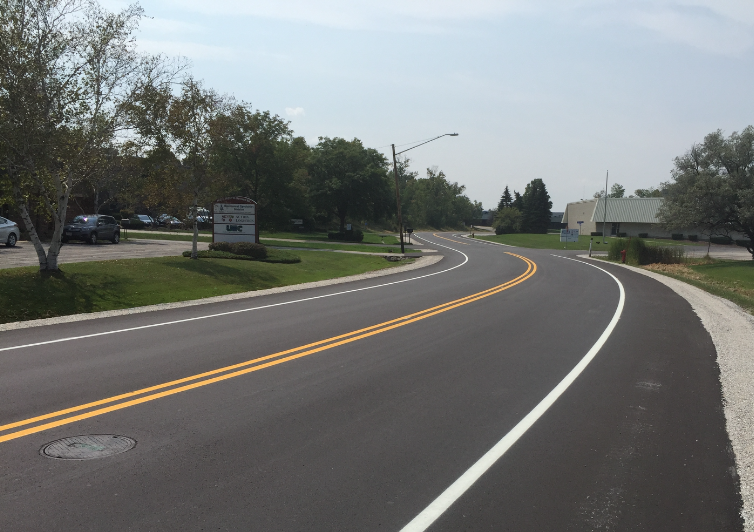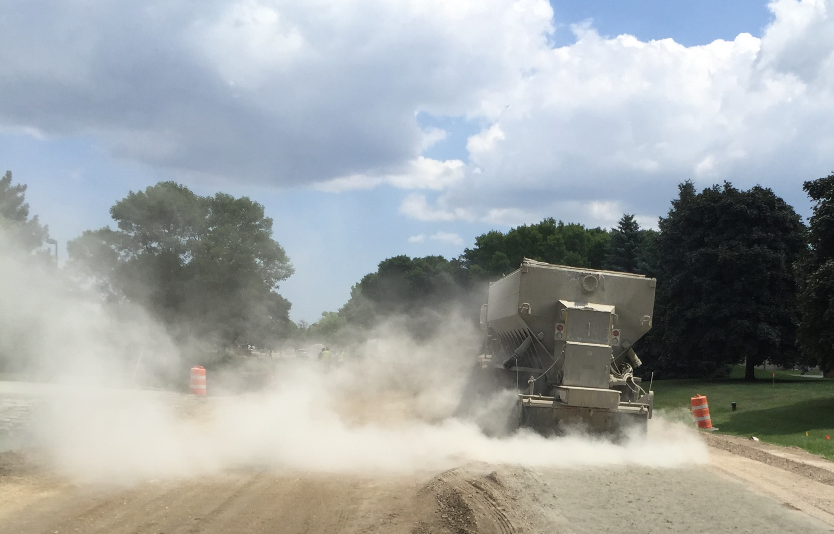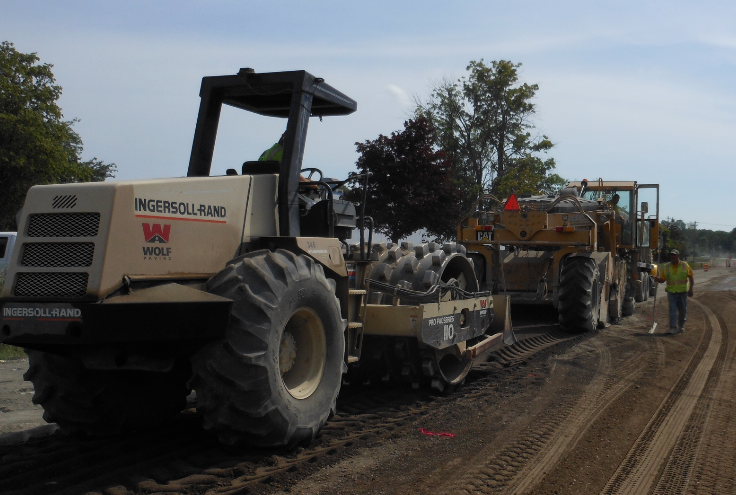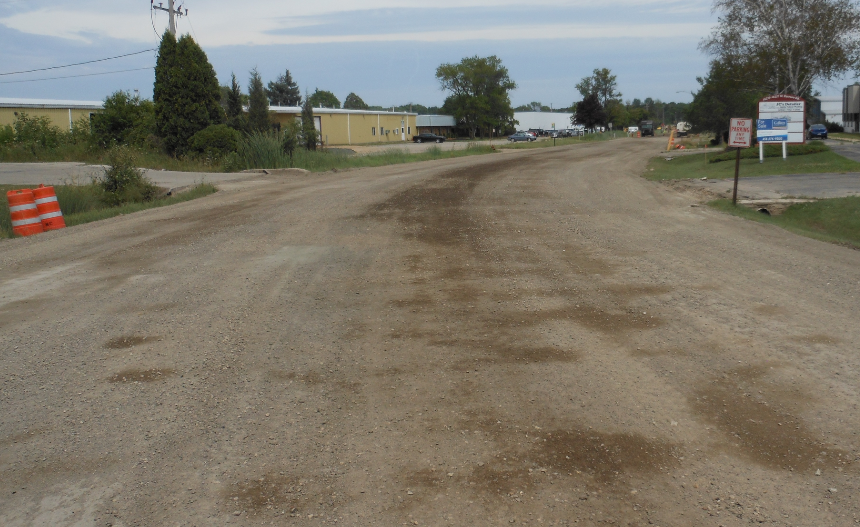New Berlin Restores Road with Cost-Effective Rehab
BY Matthew A. Yentz, P.E.

Rehabilitation isn’t always the first choice when it comes to improving a road, but when it offers nearly the full benefits of complete reconstruction at less than half the cost, it certainly becomes an attractive option. For the city of New Berlin, Wisconsin, rehabilitation soon became the only option to restore Ryerson Road. Located in the city’s industrial park, Ryerson Road was in need of either complete reconstruction or major rehabilitation. Because of the numerous surrounding manufacturing and industrial businesses, the road sees a great deal of traffic. With an average daily traffic count exceeding 3,000 vehicles, more than 300 of which are semi-trucks, the pavement could no longer withstand the pressure, with longitudinal and transverse cracking, raveling, and rutting in the asphalt.
The city initially decided to reconstruct Ryerson Road and originally included additional upgrades, such as stormwater management improvements, bioswales, and new storm sewer. In 2007, the city hired Strand Associates Inc.® to assist in these efforts. To complete the entire project would require more than $4 million in funds; a sum the city just didn’t have. The project was postponed, started up again, and then subsequently delayed until 2015 when the city decided to throw reconstruction to the curb and embark on a more sustainable and cost-effective alternative: rehabilitation or, more specifically, full depth reclamation (FDR).
“Rehabilitating Ryerson Road using FDR made sense because typically this method is completed where the subgrade soils are in good condition but the pavement has outlived its design life,” explained Paul Koszarek, P.E., C.S.T., District Manager of Professional Service Industries Inc., which was the geotechnical consultant for the project. “The pavement can be ground up and then mixed with a chemical additive to form a hard, stabilized base layer, on which new pavement can then be placed.”
In the case of this project, Strand Associates—along with the contractor team of Wolf Paving Company Inc.; Rock Solid Stabilization & Reclamation Inc.; and K.M. Golden Company Inc.—began FDR of the road in July 2015 by first pre-pulverizing the existing asphalt and base course to produce a new base comprised of recycled asphalt pavement (RAP). The resulting RAP was then initially graded.

The crew spread Portland cement over the environmentally friendly RAP. Then the equipment went through to mix the elements together.
After initially grading the recycled pavement, the design team evaluated two potential additives to increase the structural coefficient of the RAP—Class C fly ash and Type I Portland cement. Then, using the actual RAP base mixture on Ryerson Road, the team analyzed the amount of additive needed to achieve a minimum compressive strength of 300 pounds per square inch. Based on the maximum dry density of the RAP, the results showed that in order to achieve this minimum compressive strength, the team would need to add 4 percent cement or 12 percent fly ash to the recycled pavement. Though both additives were allowed during bidding, the Portland cement was ultimately chosen because locally available fly ash was in high demand and availability was limited.
After the additive was spread over the RAP to stabilize the subgrade, the pulverizer mixed the RAP and cement while injecting water to achieve the optimum moisture content. This was followed by compaction and final grading. Finally, it was left to cure, resulting in a stabilized base layer. After curing, hot-mix asphalt (HMA) was placed for the new driving surface followed by shouldering and pavement marking to complete the process.
Even though use of such techniques like cementitious stabilization is increasing, there are potential challenges with these methods. As mentioned, to make sure the end result would meet the city’s expectations and needs for Ryerson Road, the team performed extensive geotechnical testing to achieve the proper mix design. Too much cement would have caused the RAP to become too hard and crack, and too little wouldn’t have provided the amount of stabilization the road needed. Another inherent issue is that cementitious stabilization causes the base layer to be impervious. With an impervious base layer, any water that seeps into cracks in the new asphalt cannot be dispersed through the base layer but rather is trapped in the cracks, making the pavement vulnerable to freeze-thaw action. To mitigate this, annual routing and crack sealing must be completed. While cementitious stabilization requires annual maintenance, the city decided the initial cost savings outweighed those costs.
Reusing already bought and paid for material reduced the cost of the overall project. After deciding to forgo reconstruction, the city tasked the project team to develop an alternative with a construction budget of less than $1.5 million. However, final construction cost for FDR of Ryerson Road was just less than $750,000.

Wolf Paving performed initial compaction of the RAP.
In addition, FDR reduced traffic impacts over those of complete reconstruction. This was essential to the project’s success (from the standpoint of local businesses and property owners) as most of the businesses located along Ryerson Road are open 24 hours a day, 7 days a week, meaning that to keep businesses operating as usual, trucks and other traffic had to pass efficiently through the corridor at any time day or night during the 6-week construction process.
“Our team completed the full depth reclamation of Ryerson Road, and the 6-week timeline was tight, but we did it thanks to cohesive coordination when it came to construction staging,” said Sean Wolf, Vice President of Wolf Paving Company Inc. “New Berlin and Strand Associates really worked with us to make sure that the project was a success.”
To make the entire process as smooth as possible, the team held a public information meeting with the surrounding business owners. The team shared a graphic that detailed, down to 4-hour increments, where and when the work was to be done. The graphic was issued again 48 hours prior to the beginning of the project to notify businesses that the project was to proceed as scheduled. The owners then shared this information with their drivers to facilitate an efficient means of navigating the corridor throughout the rehabilitative process. In addition, flaggers were posted to help navigate traffic safely through the corridor. The graphic and subsequent efforts by the project team helped maintain a constant flow of communication among the city, its businesses and the project team.
Through extensive collaboration and communication, Ryerson Road was successfully completed September 2015. The final rehabilitation not only improved the look and quality of the asphalt, but also widened the paved surface from 24 to 34 feet. Instead of the originally planned $4 million reconstruction project that would take at least 6 months to complete, Ryerson Road was effectively improved through rehabilitation in just 6 weeks for less than $1 million. Like reconstruction, however, the FDR treatment on Ryerson Road is expected to have a full 25-year design life.

After compacting the RAP subbase, the crew performed final grading to prepare the base for asphalt paving.
“The rehabilitation of Ryerson Road has made a tremendous impact upon our community,” Mayor Ament of New Berlin said. “Not only did it make this project affordable for the city, but selecting this option enabled us to be sustainable in our construction efforts. On the whole, we are very pleased with the results and are grateful to Strand Associates for helping us complete this project.”
By using FDR for the rehabilitation process, Ryerson Road provided the city with a sustainable, cost-effective option that offers the benefits of complete reconstruction without the hefty price tag. The road now provides businesses with easier and more efficient means of transportation and serves as an attractive, sustainable asset to the industrial park, the city of New Berlin, and the entire community. As a result, the engineering and contracting team felt it was a job well done.
As Rock Solid Stabilization & Reclamation Inc., shared, the engineering firm helped provide an innovative solution. “New Berlin along with Strand Associates should be thanked by all, especially those in the recycling community,” the stabilization and reclamation firm said. “They faced deteriorating road conditions on Ryerson Road, which has businesses open 24/7, and found a solution. Not only was that solution faster, stronger, and a greener process, it also saved the city large sums of money.”
Sean Wolf agreed with this sentiment. “Wolf Paving prides itself on making asphalt as ‘green’ as possible through the use of recycling,” he shared. “Ryerson Road was a great example of how a well-designed project can be both beneficial to the environment and cost-effective for the municipality. It was truly a pleasure to work with both Strand Associates and the city of New Berlin.”
